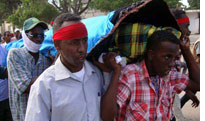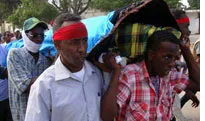News from the Committee to Protect Journalists, June 2012
East African journalists flee violence

CPJ’s Journalists in Exile report, released on June 19 ahead of World Refugee Day, found that African reporters fleeing violence in their countries make up nearly half of the 463 journalists forced into exile over the past five years. More than a quarter of the 57 journalists who fled their homes this year came from an East African nation, CPJ research shows.
Four East African countries–Somalia, Eritrea, Ethiopia, and Rwanda–rank among the top 10 of the list. CPJ’s Journalist Assistance Program, in its work to optimize advocacy and logistical and financial support, is making a special effort to help East African journalists deal with this crisis.
The report, which is available in English, French, and Spanish, is accompanied by an online video highlighting the experiences of journalists in exile.
UN prioritizes journalist security
Two reports on attacks against the press, presented at the United Nations Human Rights Council this month, rely a great deal on CPJ research and bring unprecedented international attention to how anti-press violence imperils our collective right to information.
One report, by Christof Heyns, U.N. special rapporteur on extrajudicial, summary, or arbitrary executions, focuses on attacks against the press and cites CPJ’s Impunity Index and killed statistics as well as research from its annual publication. The report marks the first time that the office has focused on attacks against journalists and impunity in anti-press violence.
The other report, by Frank La Rue, the U.N. special rapporteur on freedom of opinion and expression, highlights journalist killings as one of the greatest threats to free expression. The report cites research from CPJ’s Global Campaign against Impunity and the 2011 report “The silencing crime: Sexual violence against journalists.”
Both reports conclude that although there are adequate international conventions and protections, their implementation falls short, particularly on a state level.
Kyrgyz ambassador pledges to address Askarov case
The Kyrgyz ambassador to the United States agreed to present CPJ’s findings on Azimjon Askarov, a Kyrgyz journalist unjustly sentenced to a life term, to the president of Kyrgyzstan after a CPJ delegation met with him in Washington, D.C. The delegation included CPJ board members and prominent journalists Andrew Alexander and Clarence Page, as well as Muzaffar Suleymanov, research associate for CPJ’s Europe and Central Asia Program and the author of the newly issued report on Askarov.
The report details the unfair arrest and conviction of the journalist. Based on interviews with Askarov, his lawyers, and local witnesses, CPJ found the charges against him were in direct retaliation for his investigative reporting on law enforcement abuses during the 2010 ethnic unrest in southern Kyrgyzstan.
CPJ meets with Ethiopian official
CPJ and the African Media Initiative, in a joint effort to advocate for the release of jailed Ethiopian journalists, secured a meeting in Addis Ababa with Bereket Simon, the minister of communications in Prime Minister Meles Zenawi’s administration, to discuss existing laws in the country that stifle freedom of speech.
During the meeting, CPJ board member Charlayne Hunter-Gault, CPJ Deputy Director Robert Mahoney, and AMI board member Dele Olojede expressed concern over the continuing prosecution of journalists, particularly under the 2009 anti-terrorism law, which independent publishers and reporters say has a chilling effect on Ethiopia’s small private media sector.
According to CPJ research, there are seven journalists in Ethiopian jails, including prominent blogger and writer Eskinder Nega, who was found guilty under the anti-terrorism law on June 27 over critical articles he had written. Yet Ethiopian officials told CPJ that journalists imprisoned in the country were not in custody because of their reporting.
CPJ believes it made the point that if Ethiopia wants to build a healthy democracy, it needs a vibrant media, “the kind that exists in free societies the world over,” Hunter-Gault said in the meeting. In addition, “Ethiopia’s development, as well as its image in the world, will depend on how it relates to this important feature of a truly democratic society,” she said.
Mexico makes anti-press crimes a federal offense
After promising a CPJ delegation in 2008 and again in 2010 that Mexico would address rising anti-press crimes in the country, President Felipe Calderón’s administration approved legislation making attacks on the press a federal offense.
The constitutional amendment passed by 16 state legislatures allows federal authorities to investigate and punish crimes against journalists. CPJ welcomed the approval of the legislation, which Calderón signed on June 24 but awaits approval by Congress. The law will require new legislation and changes to the procedural and penal codes before it can begin to be enforced.
More than 45 journalists have been killed since Calderón took office in 2006, according to CPJ research.
Response to CPJ coverage’s of Brazil
CPJ’s coverage of the objections made by Brazil, India, and Pakistan to the UNESCO-led U.N. Plan of Action for Journalist Security and the Issue of Impunity led to a response by Maria Luiza Ribeiro Viotti, the Brazil permanent ambassador to the U.N., on the country’s commitment to press freedom.
Viotti’s letter affirmed Brazil’s support for UNESCO and congratulated the secretariat for the preparation of the Plan of Action, which was recently approved by the U.N. Chief Executives Board.
CPJ welcomes the adoption of the plan, whose impact will be defined by the cooperation from member states–Brazil, in particular. By voicing support for the plan, Brazil could help influence other states to send the message that they, too, do not condone anti-press violence.
Save the date
CPJ’s International Press Freedom Awards, which honor journalists who defy perilous conditions to continue reporting the news, is scheduled for Tuesday, November 20, 2012, in New York City.
Donate
CPJ’s Distress Fund provides emergency grants to journalists facing persecution for their work. Support our work and give a gift today.
Blog highlights
For exiled Eritreans in Sudan, fear greater than most
Philippines’ Aquino demonstrates selective collective will
Defining role of press in genocide prevention
State sponsored attacks: an open season on online journalists
